Last Updated on March 10, 2023
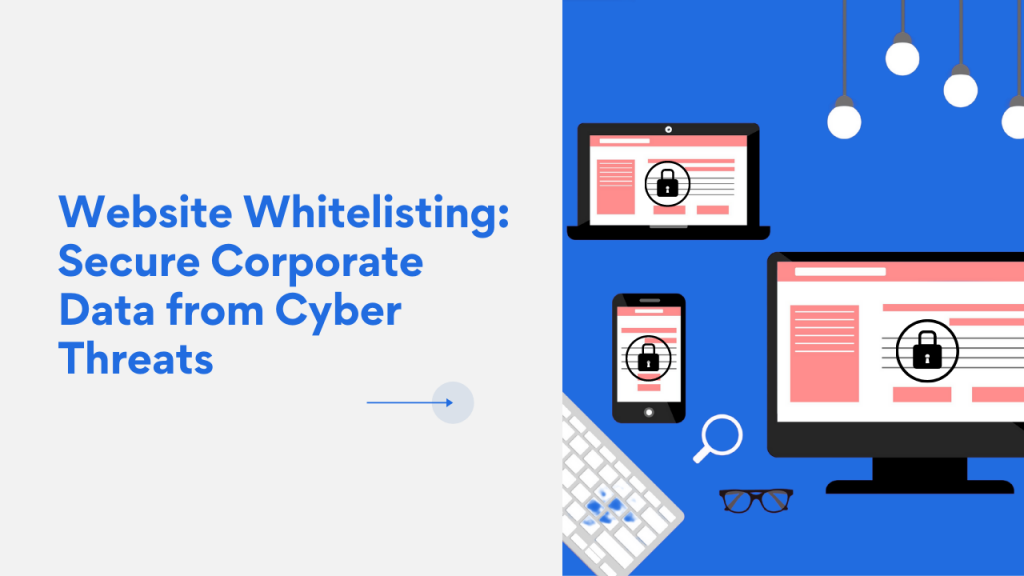
Cybersecurity threats are impending growth in businesses. Ever since the outbreak of COVID-19 and the emerging WFH trend, there’s been an alarming 600% increase in cybercrimes. These online threats include email phishing attacks, network security vulnerability, malware, ransomware, and cryptojacking.
Both SMBs and enterprises are experiencing a catastrophic financial crisis due to these malicious threats. The average cost of a malware attack on a company is $2.4 million and damage related to cybercrime is projected to hit $6 trillion annually by 2021. That’s why organizations are seeking a foolproof method to minimize risks and expenses. That brings us to website whitelisting, an indispensable feature included in mobile device management (MDM) software.
What is Website Whitelisting?
Website Whitelisting is a practice where IT professionals apply explicit network policy on company-owned devices to control users’ access and protect corporate data from potential cybersecurity risks. By adding websites to a whitelist, IT admins pre-gather a list of approved websites that are accessible to device users within the organization’s network.
Website Whitelisting can help corporations reduce great risks of undergoing malicious cyber threats such as ransomware, phishing attacks and spyware. With this particular lockdown mechanism in place, companies can rest assured that their managed devices are free from external data breaches and internal illegal site downloads. To further monitor how users are navigating the web on their mobile devices or tablets, IT admins can also apply browser lockdown for data security purposes.
Benefits of Whitelisting Websites
Cybersecurity attacks show no signs of slowing down. Google has registered 2,145,013 phishing sites as of Jan 17, 2021. This understates the urgency for companies to implement security policies for managed devices. Below are 5 significant benefits your company can reap through website whitelisting.
- Upgraded data security
Majority data violations usually derive from device tampering from end users. Hence, the most effective way to eliminate these threats is to create a list of pre-compiled websites. This allows IT admins to grant permission to business related sites only, further securing your company devices from ransomware, hackers, and other malicious cyber crimes. Whitelisting websites on managed devices can ensure higher data security and enhance enterprise mobility altogether.
- Reduced data costs
When you filter websites on your company-owned devices, you are limiting users’ website navigating experience. This helps prevent end users from visiting work-irrelevant websites like Facebook and YouTube. It also blocks any illegal downloads that may result in excessive data costs. For example, transportation and logistics companies can apply website whitelists on their drivers’ mobile devices to stop them from accessing any entertainment sites with cellular data.
- Improved productivity
Whitelisting urls on your managed devices helps employees focus on their intended tasks and boost greater productivity. For example, many retailers are now deploying the mobile point of sale (mPOS) system for more streamlined services. By whitelisting websites on these mobile devices and tablets, employees can concentrate on improving customer services in product introduction or check-outs. This greatly removes risks of unexpected data breaches and enhances business productivity.
- Minimized maintenance expenses
Apart from reduced data security risks, website whitelisting also brings the benefits of less IT maintenance expenses. As device users are restricted from accessing illegal or unsafe websites, the chance of device malfunctioning becomes relatively low as well. This enables organizations to better allocate their resources in strengthening product quality or IT infrastructure instead of extra personnel on troubleshooting.
- Enhanced user experience
Blocking websites on managed devices also improves user engagements. For example, IT admins and school teachers create a whitelist for learning websites on classroom tablets to keep students engaged in class. Malls or customer-facing businesses add brand-related websites to whitelists on interactive kiosks so customers can get the most out of their shopping journey. Through browser lockdown and url filtering, employees can provide better services and customers can enjoy more pleasant experiences.

Companies of all sizes are implementing MDM software to customize compliance policy and enhance mobility management for better control in device management. AirDroid Business MDM lets you remotely access, control, and manage all of your Android devices from one centralized dashboard called Admin Console on your PC. Learn how Android website whitelisting works on AirDroid Business MDM.
How to Whitelist Websites on Android Using AirDroid Business?
Step 1. Sign up and log into your AirDroid Business Admin Console. Navigate to “Kiosk” tab, and click “Config File”
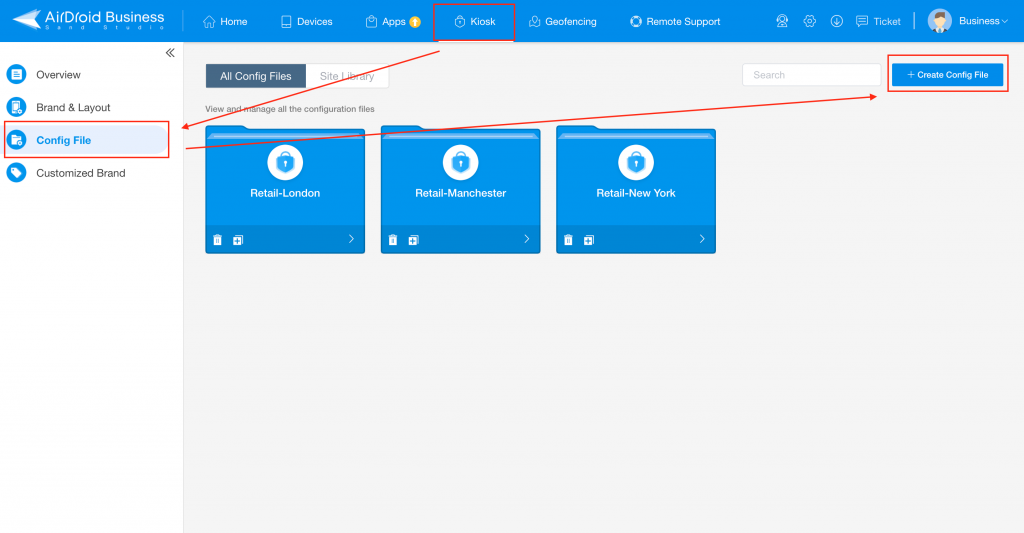
Step 2. Create and name your new Kiosk Profile. Then select “Website Allowlist” under “Kiosk Browser”
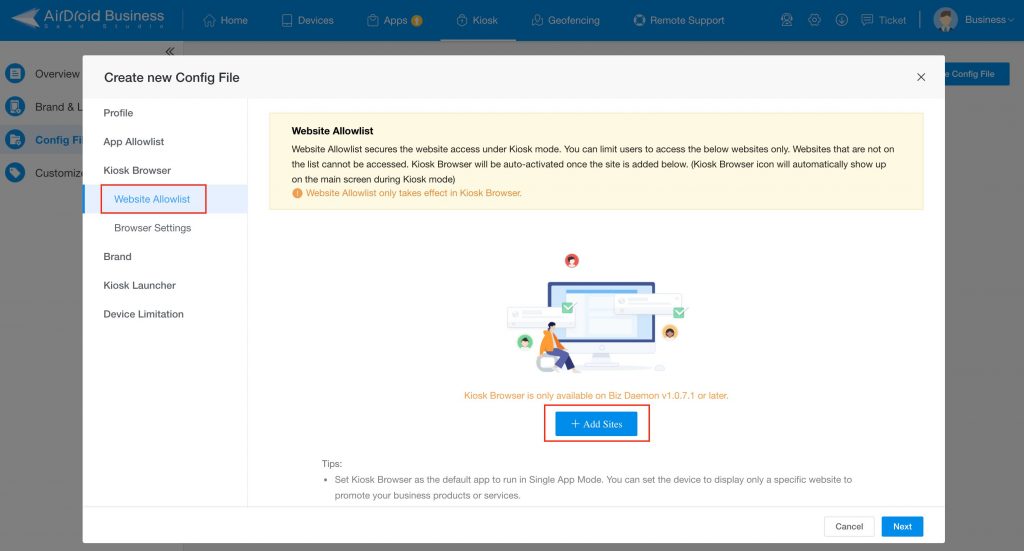
Step 3. Add the desired sites you wish your users have access to and click Save
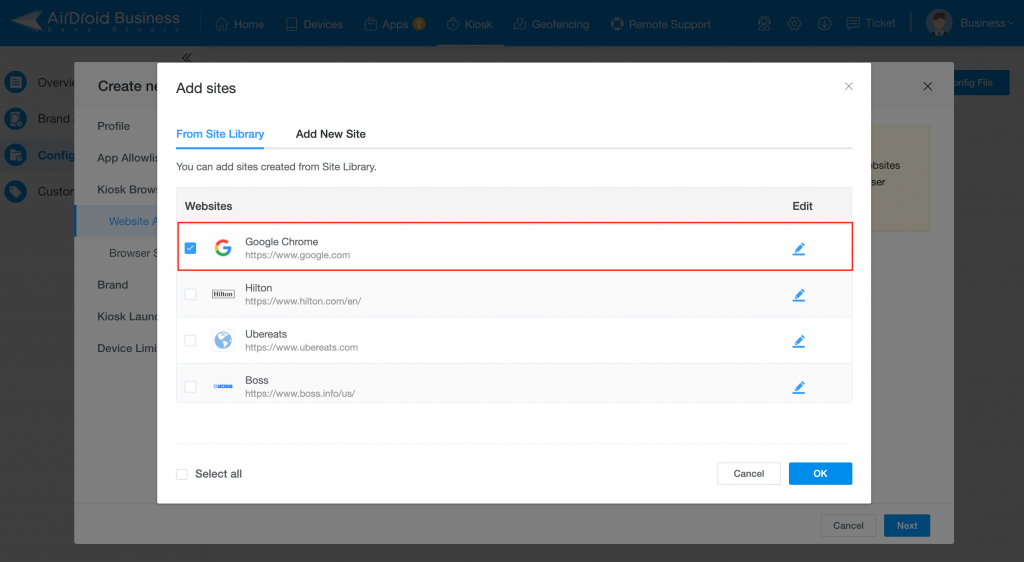
Step 4. Configure other system settings if necessary. Then apply this Kiosk Profile to your selected devices or device groups.
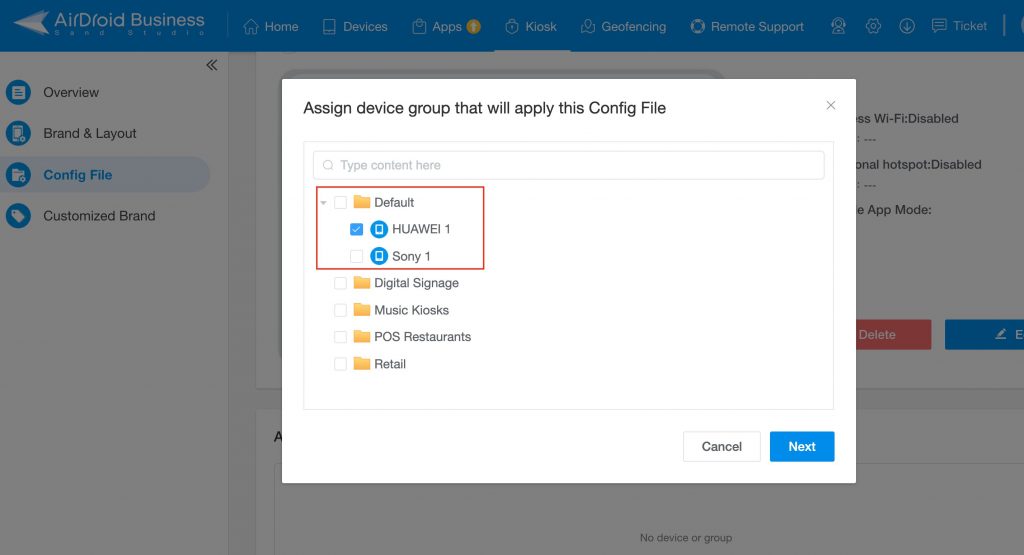
As more businesses encounter hacker attacks, data loss and other cyber threats on company-owned devices, implementing Website Whitelisting on Android with the right MDM software can no doubt sustain your business continuity in the long term. Start AirDroid Business MDM for free or contact our sales for more information today!
